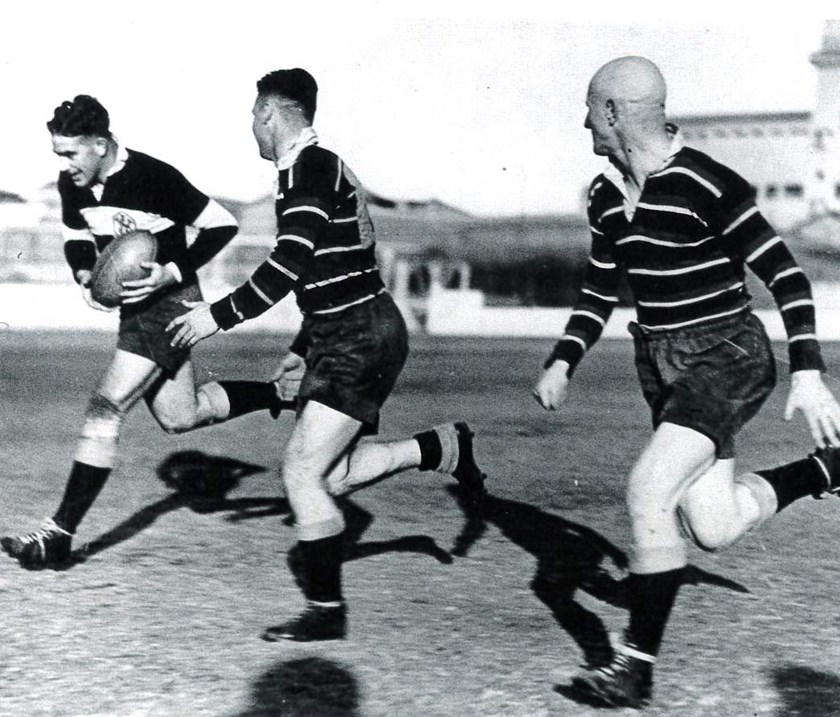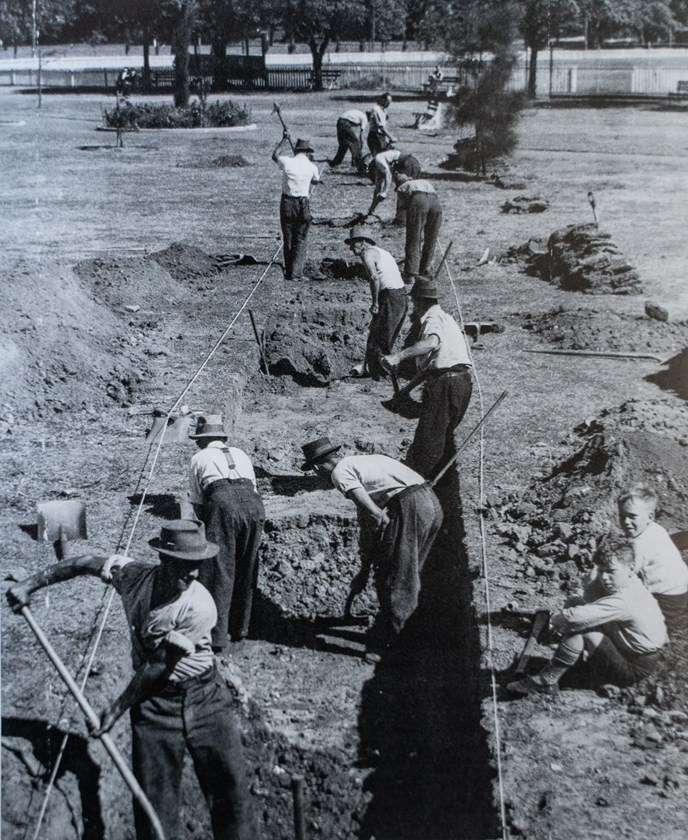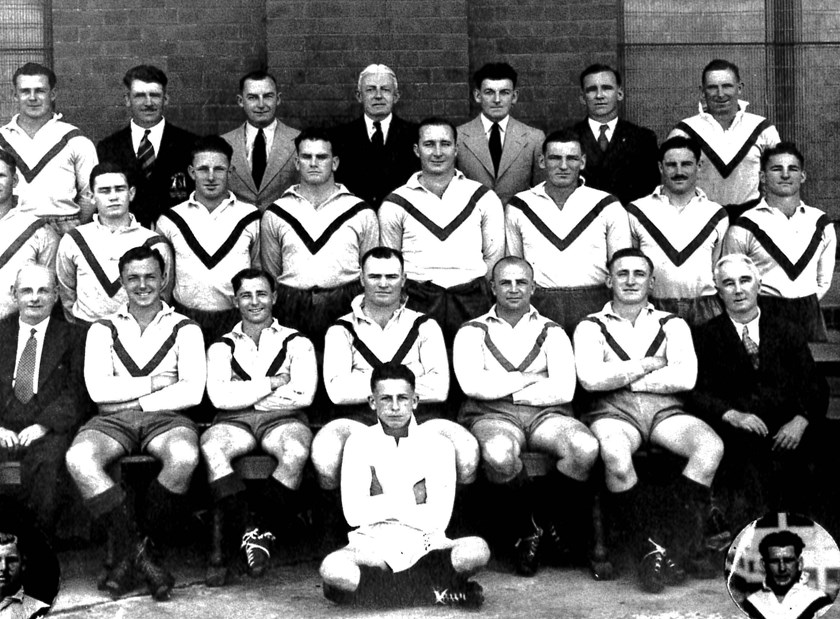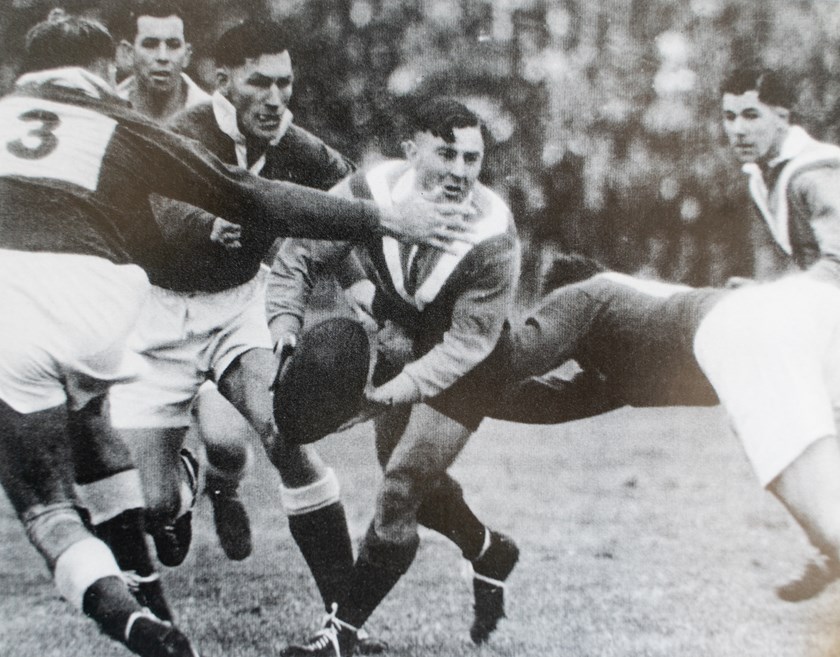1940 - 1949

As the impact of the Second World War began to affect everyday Australia, the NSWRFL also had its fair share of changes due to necessity.
Eastern Suburbs continued the rich vein of form from the 1930s to claim two Premierships, while also making the first notable change in their strip with the Wartime Jersey worn from 1944-1946.
While the country began to rebuild itself from the imprint of the war, the Tricolours did so as well with a number of Club Legends retiring towards the end of the decade.
1940 - Brown's Boys Bounce Back
| Played: | 16 |
| Won: | 11 |
| Lost: | 4 |
| Drawn: | 1 |
| Final Position: | Premiers |
Bolstered by the return of prodigal son Dave Brown, the Tricolours returned to the summit to claim the Club's fourth Premiership in six seasons, despite a considerably new looking supporting cast.
The side started their season in patchy form - notably as Dave Brown sustained a broken collarbone - and were unable to claim consecutive victories before stringing three wins in a row.
A winless period from Round 8-10 was backed up by a six-match winning streak, which saw the side claim the Minor Premiership in the final round 16-5 win over Balmain.

A torn muscle in his leg meant Brown would play no further action in the side's triumph, but the momentum had already propelled the side to the Final after a 10-3 defeat of St George in the semi.
Stand-in captain Ray Stehr delivered a Churchillian-like speech to his teammates pre-match:
"Play as hard as you can," Stehr pleaded to his men. "I'm asking you to give me the last ounce...the only thing I'm asking is that no player leaves the field with anything less than a broken arm or leg."
The firebrand forward went on to lead the way for the Red, White and Blue throughout the match, setting the tone with powerful running and bone-crunching hits, providing the inspiration for his men on the way to their 8th Premiership.
Debutants: Owen Campbell, Kevin McLean, Fred May, Maurie Kilkeary, Gerald Wenden, Sel Lisle, Bob Norval, Bill Brew
1941 - Defending the Crown
| Played: | 16 |
| Won: | 10 |
| Lost: | 6 |
| Drawn: | 0 |
| Final Position: | Runners Up |
By 1941, NSWRFL clubs were running on improvisation to field teams for the weekend, with line ups depending on the success of servicemen travelling back from country or interstate camps.
"It was a case of picking a team on Tuesday night...a different side would train on Thursday...and by Saturday the team would be different again," Charlie Christensen remembered.
"Training was generally 'all in'...involving all of those who happened to be available."
Future captain Wally O'Connell and Rugby League Legend Brian Bevan - who played just eight first-grade matches at Easts but won that year's third-grade competition - made their first-grade debuts.
Despite the logistical struggles, it was also a milestone season for the Club, with Joe Pearce playing his 150th club match, Andy Norval 100th, Rod O'Loan and Dave Brown 100th, while the Club had the best financial year in its history with total receipts at almost £3000.
On the field, the Red, White and Blue defended their crown all the way to the Final, in the process claiming an emphatic 24-22 victory in the Semi-Final against Canterbury-Bankstown - but the hopes for back-to-back titles were dashed as they were outplayed 14-31 by St George in the Final.
The year also marked the last for the glittering careers of start duo Joe Pearce and Dave Brown, who surprisingly decided to hang the boots up at the age of 28.
Debutants: Don Gulliver, Larry O'Shea, Brian Walsh
1942 - Under Attack
| Played: | 16 |
| Won: | 9 |
| Lost: | 7 |
| Drawn: | 0 |
| Final Position: | Runners Up |
The Eastern Suburbs residents were awoken by the sounds of shells screaming overhead after a volley of shells were aimed at the Sydney Harbour Bridge, with a number exploding and damaging buildings in Woollahra and Bellevue Hill - and while no lives were lost, uncertainty and fear reared their ugly heads.
Easts and Souths were forced to share the Sydney Sports Ground for training, given 20 minutes each on Tuesday and Thursday nights, while barbed wire lined Bondi Beach.

With the season in possible jeopardy, the NSWRFL decided to go ahead in May - the latest kick-off ever to a season - with the Tricolours finishing a respectable fourth before the finals and playing representative army teams in July and September to raise funds for the war.
Coached by Joe Pearce, Easts reached the Final after upsetting favourites Balmain 20-14 in the Semi, but had to settle for runners up once again as they were downed 4-18 by St George.
Debutants: Brian Bevan, Doug Fry, Wally O'Connell, Tommy Kaine, Ray Brennan, Cliff Tye, Len Portsmouth, Keith Coleman, Harold O'Brien, Wal Allan, Jack Blacker
1943 - Fall From Grace
| Played: | 14 |
| Won: | 4 |
| Lost: | 10 |
| Drawn: | 0 |
| Final Position: | Sixth |
Hopes coming from the charge of 1942 were quickly erased as the Dave Brown coached and Harry Pierce captained side quickly fell from grace with only four wins from their fourteen matches, including losing their last seven to finish just two points clear of last place.
The casualties of the side including star players meant that Pierce was the only remaining member of the successful 1930s sides, with Ray Stehr, Sel Lisle, Tom Dowling, Percy Dermond, Noel Hollingdale, Wal Bamford, Lou Rafferty and Ron and Cliff Tye unavailable due to their respective services.
Despite struggling through the year both on and off the field with difficult training circumstances, Easts finished the year on a positive note, winning the first two of their Cup Tie competition matches that followed, defeating Group 7 and Group 10 to reach the Semi-Final.
Debutants: Tim Allen, Ross Bassingthwaighte, Jack Coll, Bert Cowley, Paul Tierney, Don Sinclair, Jack Dixon, Jack Williams, Wally Rees, Tom Chilvers, Kevin Gleeson, Bert Rollason
1944 - Wartime Jersey Debuts
| Played: | 14 |
| Won: | 4 |
| Lost: | 10 |
| Drawn: | 0 |
| Final Position: | Seventh |
With war rations now at an all-time low, many of the NSWRFL teams were forced to make necessary changes to their playing strip - and Eastern Suburbs were no exception.
Season 1944 represented a changing of the guard for the Club; the last remaining member of the 1935-36-37 Premierships, captain Harry Pierce, retired mid-season after just seven games, as did District Secretary Johnny Quinlan.
The community mourned the passing of Club President and longtime worker Frank Haron - who had been involved with the Tricolours since the competition's formative years.
But the biggest change came in the form of the jersey, with the Club making the first significant change to their look since its foundation in 1908 - a light blue jersey adorning a red and a white ‘V’.
Five-Eighth Wally O'Connell took over as captain, but despite a finals finish eluding the side, change was on the horizon both on and off the field and for the world.
Debutants: Doug Doney, Michael Evans, Harry Martin, Roy Street, George McCaffrey, Keith Dallwitz, Arthur Oxford Jnr, Ernie Berrell, Sid Hobson, Rod Chapman, Ernie Hawkins, Alan Schafer, Laurie Rafferty, Ross Nixon
1945 - Dick Dunn's Day
| Played: | 16 |
| Won: | 13 |
| Lost: | 3 |
| Drawn: | 0 |
| Final Position: | Premiers |
The Tricolours bounced back the following year with the return of Arthur 'Pony' Halloway as coach and captain Ray Stehr from his war service - losing just three matches all season, (two to Wests and one to Newtown) to finish top of the table.
But Easts did away with their western Sydney counterparts in the Semi-Final, winning 28-13 to qualify for the Final thanks to a Paul Tierney hat-trick and Lionel Cooper double.
On September 1st, 1945 - the first day of spring - Easts claimed their 9th Premiership in a famous comeback victory against Balmain, highlighted by a starring performance from lock forward Dick Dunn.
Dunn etched his name in Club history, scoring three tries and kicking five goals - including the match-winner - as he tallied 19 of Easts’ 22 points in what is affectionately known as ‘Dick Dunn’s Day’.

The crowd of 44,585 had more to celebrate one day later as Japan formally signed a letter of surrender, effectively ceasing the war.
Dunn played every game during the season, scoring 178 points from 12 tries and 71 goals - a record only bettered by Dave Brown in 1935.
The Club finished with the first-grade Premiership, the Minor Premiership, the Club Championship (for the seventh time since 1930), made the Semi-Finals of reserve grade, President's Cup and Cup Tie, and reached the Grand Final in third-grade.
Debutants: Lionel Cooper, Johnny Hunter, Johnny Smith, George Watt, John Hurst, Roy Dykes, Matt McCoy, Ron O'Connell, Ray Pratt, Ken Foster
1946 - Stehr Signs Off
| Played: | 14 |
| Won: | 8 |
| Lost: | 6 |
| Drawn: | 0 |
| Final Position: | 5th |
Despite announcing his intentions to retire following the 1945 triumph, captain Ray Stehr couldn't restrain himself from playing one more season in the Red, White and Blue with Arthur 'Pony' Halloway controversially sacked.
Season 1946 promised as one of great potential, especially considering the fact that a majority of the troops from the previous, and with the return of representative football saw a number of players selected, resulting in a season of patchy form.
Defeating wooden spooners Souths in the final round, Easts missed the Semi-Finals by a single point in fifth position, and following the match, Stehr called it a day.
But despite the disappointments of the season, the reserves did the Club proud, reaching the Grand Final, while the Club took end-of-season trips to both Woollongong and Grafton.
Debutants: Bob Farrar, Alan Quinlivan, Lee Rose, Norm Rogers, Lloyd Russell, Bob Searle
1947 - Expanding Competition
| Played: | 18 |
| Won: | 5 |
| Lost: | 12 |
| Drawn: | 1 |
| Final Position: | Eighth |
The introduction of Parramatta and Manly-Warringah saw the competition expand to 10 teams and 18 regular season rounds, but the loss of experience and leadership, coupled with injuries meant that the side finished only higher than their newest opponents.
With no conflict in the world, the Club reverted back to the familiar Tricolours jersey, but unfortunately for Eastern Suburbs the season was not kind despite the re-appointment of Halloway as coach and O'Connell resuming captaincy duties for most of the season.

With no wins in the first four matches, Easts claimed a hat-trick of victories against Manly, Parramatta and St George, but only managed two more wins in the remaining eleven matches, finishing in eighth position.
In a positive for the Club, the thirds won the Minor Premiership and the Premiership, while the junior stocks continued to bloom with 1218 players registered - a record at the time - while Club Legends Dick Dunn and Sel Lisle retired at season's end.
Debutants: Bill Bray, Jack Jakeman, Brian Holmes, Pat Quinn, Kevin Brady, Vic Bulgin, Kevin Abrahamsen, Gordon Hassett, Milton Atkinson, Ted Levy, Ted Robinson, Brian Paulin
1948 - Youngsters Impress
| Played: | 18 |
| Won: | 7 |
| Lost: | 9 |
| Drawn: | 2 |
| Final Position: | Sixth |
The season was marginally better than the year previous, with yet another new coach in Percy Williams heading the charge and inconsistency with leadership.
Easts commenced the season with Jack Arnold as captrain but he was replaced later in the season by Paul Tierney. Sid Hobson and Brian Holmes also led the side when Tierney was injured.
Despite sitting in eighth position after Round 12, the side rallied to win five of their remaining six matches to finish a respectable equal sixth.
Exciting youngsters Ken McCaffrey, Darcy Russell and Vic Bulgin all made strong impressions in the first-grade side, with Bulgin earning a Kangaroo jersey, while the President's Cup side won their 11th Premiership.
Debutants: Ken McCaffery, Eric Chatham, Vic Anderson, Keith Clark, Alvie Gauci, Bill Sullivan, Lonard Sharman, Joe Rutherford, Laurie Johnson, Darcy Russell
1949 - Unwanted History, Hopeful Future
| Played: | 18 |
| Won: | 3 |
| Lost: | 14 |
| Drawn: | 1 |
| Final Position: | Tenth (Wooden Spoon) |
For the first time in the Club's 42-year history, the first-grade team finished at the bottom of the table, claiming the dreaded wooden spoon.
It was an unfortunate way to end a decade that featured two Premierships and two second-place finishes, with just three wins - two of those in the final month - there was still hope for the future.
Ernie Norman's reserve grade side overcame winning just one of their first six games to come home with a wet sail and claim the Premiership title, with future champions Ferris Ashton and Col Donohoe prominent in the success.
Wally O'Connell and Jack Arnold both hung up the boots, while there were bright spots with the President's Cup winning their second title in a row while the A Grade competition attracted 19 clubs.
The 1940s began with a Premiership and ended with a wooden spoon - and there was plenty of intrigue to what the 1950s would hold...
Debutants: Dick Healy, Ken Hunter, Billy Morris, Len Solomon, Jim Hunt, Ralph Stewart, Frank Burke, John 'Mick' Phelan, John Murphy, Col Donohoe, Strachan Robinson, Ian Verrender, John Sellgren, Reg Beath

Sydney Roosters respect and honour the Traditional Custodians of the land and pay our respects to their Elders past, present and future. We acknowledge the stories, traditions and living cultures of Aboriginal and Torres Strait Islander peoples on the lands we meet, gather and play on.





